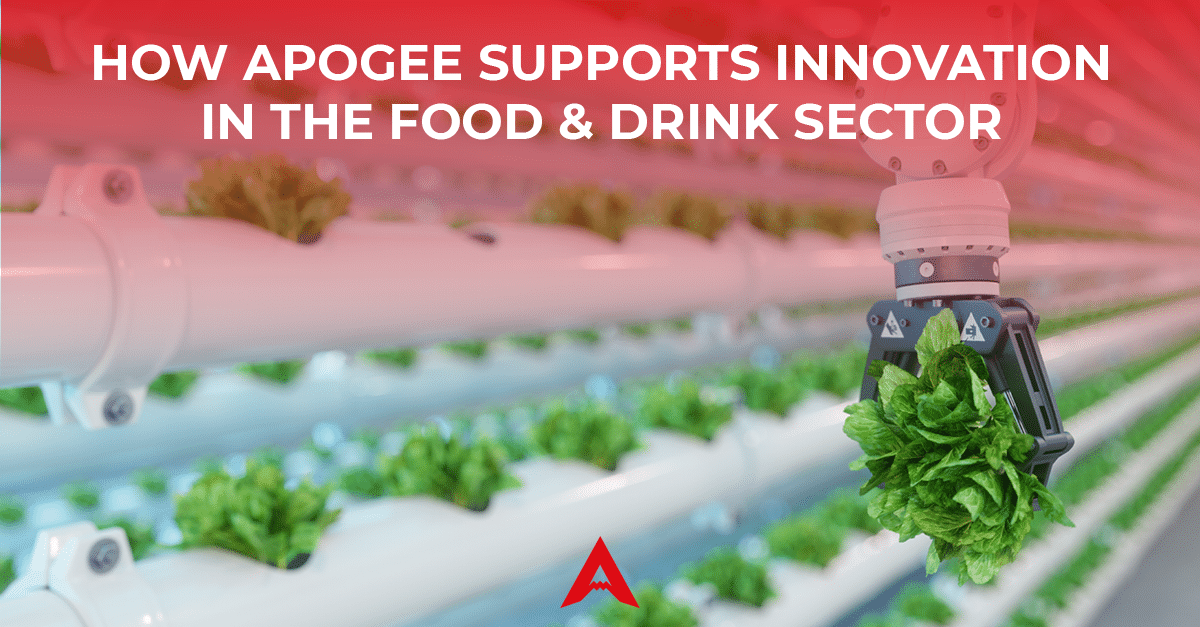
How Apogee supports innovation in the Food & Drink sector
In this blog, the funding experts Apogee Associates explore innovation in the UK’s Food & Drink sector, and how businesses can benefit from the R&D relief with their help.
Innovation and R&D in the UK’s Food & Drink sector
The food & drink industry is the UK’s largest manufacturing sector (bigger than Automotive and Aerospace combined) [1] with over £400 million in R&D expenditure recorded in 2020[2].
Of the 101 food and drink businesses surveyed in April 2020 for leading accountancy and business advisory firm BDO’s, 79% stated that R&D and innovation are key areas of focus for them, particularly in automation, digitalisation, and new product development[3].
With the rise of environmental concerns and Government plans to achieve a net zero economy, Food and Drink businesses are also focusing on reducing their carbon footprint.
Between 2019 and 2020, members of the Food and Drink Federation (FDF, the membership body for food and drink manufacturers) reported a 58% reduction in their CO2 output from manufacturing energy consumption and are working towards achieving net zero across the farm-to-fork supply chain by 2040.
The rise of the plant-based lifestyle
According to market research company Appinio, 63.5% of Brits bought vegan food items in 2021,[4] while Ipsos found that plant-based alternatives to milk are used by 48% of British adults [5].
In response, 30% of businesses involved in BDO’s survey said they are investing in the development of new meat-free, vegan, and plant-based products[6].
The war on plastic
With 82% of consumers surveyed by YouGov saying they are trying to reduce their plastic waste[7], and nearly half admitting they would pay extra for more sustainable packaging[8], this area of innovation could be vital for the survival and success of food & drink companies.
Following the introduction of the Plastic Packaging Tax in April 2022, development of sustainable alternatives is expected to skyrocket.
Mintel predicts that paper and board packaging will have the largest share of the food packaging market, projected at 54% for 2022[9].
24% of BDO’s surveyed companies stated they are now investing in R&D to reduce plastic packaging and develop sustainable alternatives[10].
However, the battle doesn’t end there; figures show that the environmental impact of food wastage far outweighs that of plastic packaging.
According to The Organisation for Economic Co-operation and Development (OECD), an international organisation which campaigns to “build better policies for better lives”, plastics emit 3.4% of global greenhouse gas emissions throughout their lifecycle[11].
However, Our World in Data has found that 6% of global greenhouse gas emissions come from food wastage[12].
The sector has a way to go to achieve Net Zero, but the FDF says its members are making strides in the right direction with a 30+% reduction in food waste each year since 2011[13].
Are R&D tax credits an underutilised opportunity for food and drink businesses?
Research & Development (R&D) tax relief is a government incentive designed to encourage and assist in the funding of innovation in the UK.
The HRMC-run scheme was introduced in 2000 and provides companies with tax relief for qualifying R&D activities.
The scheme allows companies investing time, money, and resources into developing new or existing products, services, or processes, to be rewarded with a tax reduction, rebate, or credit (cash).
By stimulating innovation, the scheme indirectly supports the UK’s economic growth, as qualifying businesses receive funds to allocate to further R&D activities, their supply chain, and job creation.
Despite billions of pounds being available for R&D support, so many food & drink businesses are failing to take advantage of tax relief by under-claiming or not claiming at all due to a lack of understanding of the system.
So, what are the benefits of R&D tax relief, who is eligible, and how can Apogee help?
How Food & Drink businesses can benefit from R&D tax credits
With 97% of UK food & drink businesses falling under the SME bracket[14] for R&D tax relief purposes, a huge proportion of the sector could recover much of their costs through the incentive.
R&D tax relief can assist SMEs by supporting their R&D activities, helping them to enhance their competitiveness in the market, leading to growth, job creation, and improved cash flow.
The funds can also be utilised to reduce the environmental impact of food and drink companies, supporting investments in renewable energy sources such as solar panels, or a new manufacturing line for sustainable packaging production, as examples.
Which activities are eligible?
Activities that meet the definition of innovation and therefore qualify for the R&D tax relief schemes within the Food & Drink sector could include:
- Enhancing the nutritional value of existing products by removing allergens, food dyes and preservatives, or iterating the recipe’s formula to extend shelf life
- Development of novel ‘free from’ products
- Improving the efficiency of production processes, reducing operating costs and wastage
- Reducing the carbon footprint of products and manufacturing processes by developing sustainable packaging, or improving logistical operations through the development and integration of innovative IT systems
- Reacting to changes in regulation; ensuring products comply with new legislation whist preserving their taste and nutritional quality
Why I AM NUT OK considers Apogee the Big Cheese of R&D
Let’s consider Apogee client, I AM NUT OK, an artisanal cheese alternatives business born out of a need for a newly-vegan, cheese-loving Italian.
Background
American-born Angela Chou began crafting homemade alternatives to cushion partner Nivi Jasa’s transition to veganism as a cheese-loving Italian, right from their kitchen in Hackney.
The business
The couple turned their passion project into a thriving artisanal business, using trial-and-error processes to develop cheese alternatives that:
- Had the right properties to melt when exposed to heat
- Had a long shelf life
- Replicate the taste of dairy cheeses
- Replicate the texture of dairy cheeses
Eligibility
Their processes were a perfect example of innovation and an indicator of technical uncertainty, which meets one of HMRC’s eligibility criteria.
With Nivi and Angela having several years’ experience in the sector, the business ticked another box for eligibility.
R&D claims
Apogee’s R&D Tax Credit application support for I AM NUT OK has allowed the company to recover costs associated with:
- Salaries of staff working on R&D activities
- Utility expenses
- Materials utilised in the development and production of their products
Outcome
The funds recovered from HMRC through the R&D Tax Relief Scheme provided I AM NUT OK with a lump sum to reinvest in their business.
How Apogee is taking R&D Relief off the plates of Food & Drink Businesses
With funding available from HMRC, and support available from R&D experts like Apogee, potential for growth in Food & Drink businesses is vast.
Unlike many R&D providers, Apogee takes the burden of R&D applications off their customers’ plates, so they don’t have to spend hours filling in forms they don’t understand or trawling through financial data.
Apogee’s team of in-house experts are specialists at what they do; their refined process eliminates errors and ensures you recover everything you are entitled to!
If you’re unsure about your eligibility or need support with your R&D tax credit claims, Apogee can help.
To arrange your free, no-obligation consultation with one of Apogee’s experts, email jack@apogee.co.uk or come to visit us at the Bread & Jam Fest!
SOURCES:
[1] Our Industry at a Glance 2022 (fdf.org.uk) Section 1, Paragraph 1
[2] “Research and development expenditure in food, beverages and tobacco product businesses in the United Kingdom (UK) from 2002 to 2020” (statista.com)
[3] BDO Food and Drink Report 2022 (bdo.co.uk) Page 19, Paragraph 2
[4] Meat Alternatives Research UK (research.appinio.com) Graph 2 of 14
[5] Almost half of UK adults set to cut intake of animal products (ipsos.com)
[6] BDO Food and Drink Report 2022 (bdo.co.uk) Page 19, Paragraph 3
[7] Most Brits support ban on harmful plastic packaging (yougov.co.uk) Paragraph 2
[8] Most Brits support ban on harmful plastic packaging (yougov.co.uk) Paragraph 5
[9] UK Food and Drink Packaging Market Report 2022 (store.mintel.com) Paragraph 4
[10] BDO Food and Drink Report 2022 (bdo.co.uk) Page 16, Paragraph 5
[11] Plastic leakage and greenhouse gas emissions are increasing (oecd.org) Paragraph 7
[12] Food waste is responsible for 6% of global greenhouse gas emissions (ourworldindata.org) Paragraph 7
[13] Our Industry at a Glance 2022 (fdf.org.uk) Section 4, Paragraph 2
[14] Our Industry at a Glance 2022 (fdf.org.uk) Section 1, Paragraph 2


